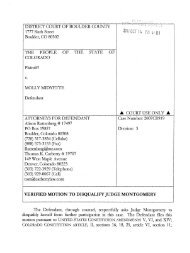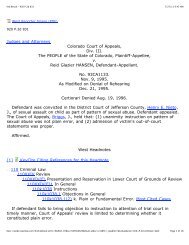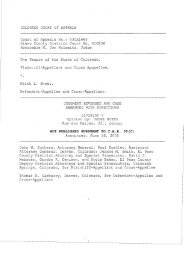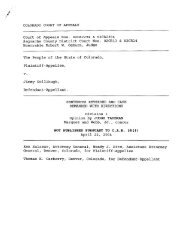People v. Wiegand, 07CA362, (Colo. App. June 10, 2010)
People v. Wiegand, 07CA362, (Colo. App. June 10, 2010)
People v. Wiegand, 07CA362, (Colo. App. June 10, 2010)
Create successful ePaper yourself
Turn your PDF publications into a flip-book with our unique Google optimized e-Paper software.
07CA0362 Peo v. <strong>Wiegand</strong> 06-<strong>10</strong>-20<strong>10</strong><br />
COLORADO COURT OF APPEALS<br />
_______________________________________________________________________________<br />
Court of <strong>App</strong>eals No. 07CA0362<br />
Chaffee County District Court No. 05CR164<br />
Honorable Charles M. Barton, Judge<br />
_______________________________________________________________________________<br />
The <strong>People</strong> of the State of <strong>Colo</strong>rado,<br />
Plaintiff-<strong>App</strong>ellee,<br />
v.<br />
Michael H. <strong>Wiegand</strong>,<br />
Defendant-<strong>App</strong>ellant.<br />
_______________________________________________________________________________<br />
JUDGMENT REVERSED AND CASE<br />
REMANDED WITH DIRECTIONS<br />
Division IV<br />
Opinion by JUDGE DAILEY<br />
Carparelli and Hawthorne, JJ., concur<br />
NOT PUBLISHED PURSUANT TO C.A.R. 35(f)<br />
Announced <strong>June</strong> <strong>10</strong>, 20<strong>10</strong><br />
_______________________________________________________________________________<br />
John W. Suthers, Attorney General, Jennifer A. Berman, Assistant Attorney<br />
General, Denver, <strong>Colo</strong>rado, for Plaintiff-<strong>App</strong>ellee<br />
Thomas K. Carberry, Denver, <strong>Colo</strong>rado, for Defendant-<strong>App</strong>ellant
Defendant, Michael H. <strong>Wiegand</strong>, appeals the judgment of<br />
conviction entered upon jury verdicts finding him guilty of<br />
enticement of a child, sexual assault on a child, unlawful sexual<br />
contact, and twenty-three counts of exploitation of children. We<br />
reverse and remand for a new trial.<br />
Defendant was charged with the above-listed offenses based<br />
on allegations that he (1) enticed a nine-year-old girl to enter his<br />
store, (2) sexually assaulted her by tickling her all over her body,<br />
including on her breasts and buttocks, and (3) took sexually<br />
suggestive pictures of her.<br />
Defendant appeared before two different judges, one in county<br />
court and one in district court, over the course of the proceedings<br />
below. 1 On numerous occasions before trial, defendant informed<br />
both judges that he wanted but could not afford a lawyer.<br />
Defendant informed the county court judge that he did not<br />
believe he qualified for representation by the public defender, and<br />
the county court judge responded that he “was not going to push<br />
[defendant] on that issue.” The county court judge made no further<br />
1 The district court judge presided over the trial. All references to<br />
the “trial court” therefore refer to the district court judge.<br />
1
inquiries or findings regarding defendant’s eligibility for the public<br />
defender. However, in a subsequent hearing, the trial court<br />
observed that the county court judge “previously made a finding<br />
that [defendant was not] eligible for the public defender.”<br />
The public defender’s office later reported to the trial court<br />
that defendant had supplied inadequate financial documentation to<br />
establish his eligibility for appointment of counsel and that what<br />
little documentation was provided indicated that defendant’s<br />
income was above the eligibility guideline.<br />
Based on this report, the trial court determined that it had<br />
insufficient evidence to appoint counsel but that it would revisit the<br />
issue if defendant provided additional proof of his income. Then<br />
stating that “we need to keep this case moving,” the trial court<br />
informed defendant that he could proceed with private counsel if he<br />
so desired. When defendant again stated that he did not “have the<br />
funds for a private counsel,” the court set the matter for preliminary<br />
hearing without further advising him concerning, or inquiring<br />
about, his representation by counsel.<br />
On the first day of trial, defendant told the court, “I would love<br />
to have counsel” but “can’t afford it.” The trial court again informed<br />
2
him that, while he did not qualify for appointed counsel, he had a<br />
right to retain an attorney of his choosing. Without any further<br />
advisement about or inquiry into the dangers of self-representation,<br />
the court commenced the trial.<br />
Following the close of evidence, the jury found defendant<br />
guilty of the above-mentioned charges. Subsequently, the trial<br />
court sentenced him to concurrent (1) probationary terms of ten<br />
years to life on the enticement of a child and sexual assault on a<br />
child convictions and (2) twenty-four-month jail terms on the<br />
convictions for unlawful sexual contact and exploitation of children.<br />
I. Right to Counsel<br />
Defendant contends, the <strong>People</strong> concede, and we agree, that<br />
the trial court violated defendant’s Sixth Amendment right to<br />
counsel when it allowed him to proceed pro se to trial without first<br />
determining whether he had knowingly and intelligently waived his<br />
right to counsel.<br />
The fundamental right to counsel guaranteed by both the<br />
Sixth Amendment to the United States Constitution and article II,<br />
section 16 of the <strong>Colo</strong>rado Constitution is considered essential to a<br />
fair trial. <strong>People</strong> v. Arguello, 772 P.2d 87, 92 (<strong>Colo</strong>. 1989).<br />
3
A defendant may, however, waive his or her right to counsel.<br />
King v. <strong>People</strong>, 728 P.2d 1264, 1268 (<strong>Colo</strong>. 1986). To be valid, the<br />
waiver must be voluntary, knowing, and intelligent based on the<br />
circumstances of each case. <strong>People</strong> v. Smith, 77 P.3d 751, 757<br />
(<strong>Colo</strong>. <strong>App</strong>. 2003). Whether a waiver is voluntary, knowing, and<br />
intelligent presents a mixed question of law and fact which we<br />
review de novo. <strong>People</strong> v. Montoya, ___ P.3d ___, ___, 20<strong>10</strong> WL<br />
726037, *2 (<strong>Colo</strong>. <strong>App</strong>. No. 08CA1322, Mar. 4, 20<strong>10</strong>).<br />
Waiver of the right to counsel may be made expressly or<br />
impliedly. <strong>People</strong> v. Rawson, 97 P.3d 315, 317 (<strong>Colo</strong>. <strong>App</strong>. 2004).<br />
An implied waiver occurs when “the record as a whole, including<br />
the reasons given by the defendant for not having counsel, [shows]<br />
that the defendant knowingly and willingly undertook a course of<br />
conduct that demonstrates an unequivocal intent to relinquish or<br />
abandon his or her right to representation.” <strong>People</strong> v. Alengi, 148<br />
P.3d 154, 159 (<strong>Colo</strong>. 2006). “A defendant's pattern of obstreperous,<br />
truculent, and dilatory behavior may be deemed relevant as to<br />
whether such conduct has been undertaken with full awareness of<br />
the consequences of doing so.” Id.; see also <strong>People</strong> v. Tellez, 890<br />
4
P.2d 197, 198 (<strong>Colo</strong>. <strong>App</strong>. 1994) (“the defendant cannot delay his<br />
trial indefinitely under the guise of seeking counsel”).<br />
“Because there exists a strong presumption against the waiver<br />
of a fundamental constitutional right, the trial court has the duty to<br />
make a careful inquiry about the defendant’s right to counsel and<br />
his or her desires regarding legal representation.” Alengi, 148 P.3d<br />
at 159.<br />
To make certain that a defendant’s waiver of counsel is<br />
knowing and intelligent, the trial court should ensure “that the<br />
defendant understands the nature of the charges, the statutory<br />
offenses included within them, and the range of allowable<br />
punishment thereunder.” Arguello, 772 P.2d at 94 (quoting Von<br />
Moltke v. Gillies, 332 U.S. 708, 724, 68 S.Ct. 316, 323, 92 L.Ed.2d<br />
309 (1948) (plurality opinion)). The record should also demonstrate<br />
that the defendant was sufficiently “‘made aware of the dangers and<br />
disadvantages of self-representation” such that the defendant<br />
“knows what he [or she] is doing and his [or her] choice is made<br />
with eyes open.” Id. at 95 (quoting Faretta v. California, 422 U.S.<br />
806, 835, 95 S.Ct. 2525, 2541, 45 L.Ed.2d 562 (1975)).<br />
5
The requirement that a defendant knowingly and intelligently<br />
waive the right to counsel applies regardless of whether the<br />
defendant is determined to be indigent. See Rawson, 97 P.3d at<br />
322; see also State v. Wilbur, 976 S.W.2d 15, 16 (Mo. Ct. <strong>App</strong>. 1998)<br />
(“Whether or not indigent, the defendant must be admonished on<br />
the perils of self-representation.”); cf. United States v. Allen, 895<br />
F.2d 1577, 1578-79 (<strong>10</strong>th Cir. 1990) (after defendant refused<br />
appointed counsel and expressed intention to seek and retain<br />
private counsel, court’s failure to advise under Sixth Amendment<br />
was reversible error).<br />
Here, the record demonstrates that defendant never explicitly<br />
waived his right to counsel. At no time did he expressly forgo his<br />
right to counsel. To the contrary, he repeatedly informed the court<br />
that he wanted but could not afford counsel.<br />
Neither does the record demonstrate an implied waiver of<br />
counsel. Although defendant requested several continuances for<br />
the purpose of retaining counsel and failed to comply with the<br />
public defender’s procedures for determining eligibility, we do not<br />
construe this conduct as an implied waiver. See King, 728 P.2d at<br />
1269 (defendant’s failure to comply with the court’s procedure for<br />
6
applying for public defender representation did not constitute an<br />
implied waiver of the right to counsel).<br />
Moreover, the trial court did not take adequate steps to ensure<br />
that any waiver of defendant’s right to counsel was knowing and<br />
intelligent. In this regard, we note that the court did not comply<br />
with the requirements of Arguello.<br />
In the first instance, the court misadvised defendant as to the<br />
potential punishment he faced with respect to the enticement and<br />
sexual assault on a child charges. At one point, the trial court<br />
advised defendant that the enticement of a child and sexual assault<br />
on a child charges carried determinate sentences ranging from two<br />
to six years in prison. However, pursuant to section 18-1.3-<br />
<strong>10</strong>03(5)(a)(IV), (VII) , C.R.S. 2009, both offenses constitute sexual<br />
offenses which carry indeterminate sentences ranging from two<br />
years to life to six years to life in the department of corrections.<br />
In the second instance, both of the judges failed to make<br />
certain pertinent inquiries under Arguello, such as whether<br />
defendant understood (1) his right to confront and cross-examine<br />
the witnesses against him; (2) his right to have witnesses testify in<br />
his behalf; and, most important, (3) if he represented himself, the<br />
7
great risk of not properly presenting his case. 2 See Arguello, 772<br />
P.2d at 95-98 (relying on the <strong>Colo</strong>rado Trial Judges Benchbook for<br />
the inquiries a judge should make of “a defendant who appears in<br />
court without counsel if he desires counsel”).<br />
While a trial court’s failure to substantially comply with this<br />
requirement does not automatically render the waiver invalid, it is<br />
an exception which should rarely be invoked. Id. at 96. We<br />
perceive, and the <strong>People</strong> have argued, no facts in the record which<br />
would lead us to invoke that exception here. See <strong>People</strong> v. Smith,<br />
881 P.2d 385, 388 (<strong>Colo</strong>. <strong>App</strong>. 1994) (despite the lack of specific<br />
inquiry into many of the areas covered in an Arguello advisement,<br />
defendant’s waiver was knowing and voluntary where he expressed<br />
a desire to proceed pro se and engaged in extensive courtroom<br />
misconduct).<br />
Under the circumstances, we conclude that the record does<br />
not establish that defendant knowingly, voluntarily, and<br />
intelligently waived his right to counsel, and that, consequently,<br />
reversal for a new trial is required.<br />
2 The failure to make these inquiries may well be because two<br />
judges were involved in this case, and each assumed the other had<br />
complied with Arguello.<br />
8
II. Other Contentions<br />
Based on our decision to reverse and remand for a new trial,<br />
we decline to address the remaining issues raised by defendant.<br />
The judgment of conviction is reversed and the case is<br />
remanded to the trial court for a new trial.<br />
JUDGE CARPARELLI and JUDGE HAWTHORNE concur.<br />
9













